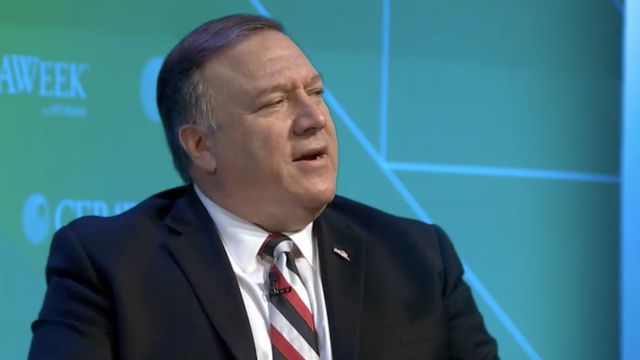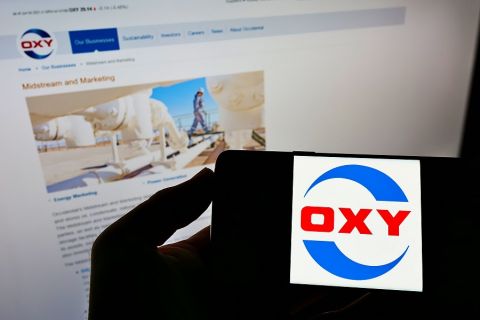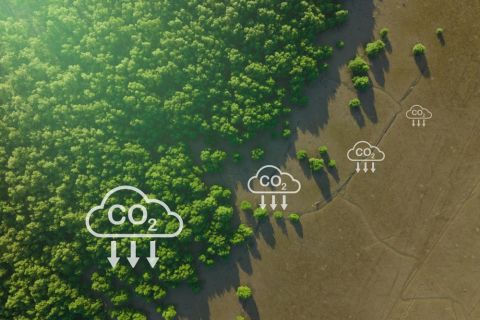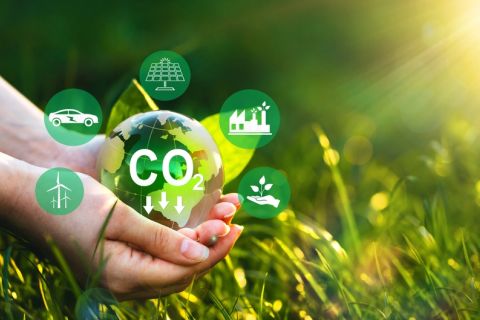
U.S. Secretary of State Mike Pompeo told CERAWeek by IHS Markit attendees that the U.S. needs their help to counter the world’s bad actors. (Source: Screen shot from CERAWeek website)
HOUSTON—U.S. Secretary of State Mike Pompeo asked the global energy industry for help in foiling Russia, China and Iran, and promoting change in Venezuela in an evening keynote address March 12 at CERAWeek by IHS Markit.
“We don’t want our European allies hooked on Russian gas through the Nord Stream 2 project any more than we ourselves want to depend on Venezuela for our oil supplies,” he said. The pipeline project would connect Russia to Germany via Finland, Sweden and Denmark. The Trump administration and several European countries oppose the project, fearing it will jeopardize the continent’s energy security.
“We all know the story in Russia,” he said. “It invaded Ukraine to get access to oil and gas reserves and in turn deprived Ukraine of the possibility of developing those resources for itself and its pipelines and its networks to bring energy to its own people.”
To counter that, Pompeo said, the State Department has been working to help clear the way for U.S. companies to export hydrocarbons abroad.
“The truth is, we’re not just exporting American energy,” he said. “We’re exporting our commercial value system to our friends and to our partners.”
Earlier in the day, Pompeo was reported to have met with top executives from BP Plc, Chevron Corp., Total SA, Royal Dutch Shell Plc, ConocoPhillips and Occidental Petroleum Corp., according to Reuters. The secretary was reported to encourage those companies to concentrate on exporting to Asian markets to further isolate Iran.
Another player Pompeo targeted was China, which has positioned itself as Latin America’s largest creditor. Ironically, that strategy may be backfiring in Venezuela as that country’s troubles mount.
Argus Media reported in October that Venezuela owes Chinese bankers somewhere in the neighborhood of $23 billion which it has been paying off in oil exports. However, when President Nicolás Maduro Moros visited China in September, requesting an extension to the stoppage of oil debt payments, the Chinese refused.
The deal is predicated on the average price of a barrel between 2007 and 2014, when oil’s price was much higher. That obligates Venezuela to provide more oil to China at a time when its production is in a free fall.
As Gabe Collins wrote recently in The National Interest, “In a nutshell, China now finds itself in a very different position that it would have imagined a decade ago when the oil-backed loans seemed like a logical and efficient path to securing badly-needed oil supplies while also quietly building a foothold of influence in the United States’ backyard.”
On March 11, Pompeo tweeted that he was pulling U.S. diplomatic personnel out of Venezuela, describing the situation there as “deteriorating” and adding that “the presence of U.S. diplomatic staff at the embassy has become a constraint on U.S. policy.”
The U.S. is the largest exporter of Venezuelan crude oil, but because of sanctions imposed on state oil company Petróleos de Venezuela SA (PDVSA), revenue from those sales are routed to accounts accessible by opposition leader Juan Guaidó, not to the regime of Nicolás Maduro Moros. A similar arrangement allows U.S. refiner Citgo, a unit of PDVSA, to continue to operate and provide its revenue to Guaidó.
More than 50 countries have joined Washington in recognizing Guaidó as the legitimate interim president of Venezuela.
On March 11, Pompeo also pressured Indian Foreign Secretary Vijay Gokhale during a meeting in Washington, D.C., to stop paying the Maduro government for Venezuelan crude, which would be a significant blow to the regime. India is the second-largest cash-paying consumer of Venezuelan crude after the U.S.
The Trump administration estimates that the sanctions could cost the Maduro government upward of $11 billion, the Voice of America reported. They will also impair the country’s production of oil. Venezuela produces heavy crude and has been dependent on U.S. ultralight crude, or condensate, to mix with its oil so that it can move through pipelines.
And Pompeo stressed that the U.S. has no intention of letting up on the pressure.
“We’re committed to using all the economic tools at our disposal with Venezuela,” he said. “Our sanctions against Venezuela kicked in back in January. We are hoping and working towards a good outcome there.”
Recommended Reading
Occidental Reports ‘Great Progress’ on Net-zero Pathway, DAC
2024-02-21 - Most of Occidental Petroleum’s planned $600 million investment in emerging low-carbon ventures for 2024 will go to direct air capture facility STRATOS, CEO Vicki Hollub says.
Red Trail Energy Issues Carbon Removal Credits
2024-03-06 - Red Trail Energy’s CO2 removal credits is the largest durable carbon removal project registered on the Puro Registry to date.
SLB to Acquire Majority Stake in Aker Carbon Capture
2024-03-31 - SLB and Aker Carbon Capture plan to combine their technology portfolios, expertise and operations platforms to bring carbon capture technologies to market faster and more economically, SLB said in a news release.
1PointFive, AT&T Enter Carbon Removal Pact
2024-03-13 - 1PointFive said it is also participating in AT&T’s Connected Climate Initiative to collaborate on carbon removal solutions like direct air capture.
Trace Carbon Solutions Applies for First Phase of Class VI Wells at Evergreen Hub
2024-03-12 - Trace is applying for its subsidiary Evergreen Sequestration Hub to be allowed to permanently sequester CO2 in underground geological formations in Louisiana.






